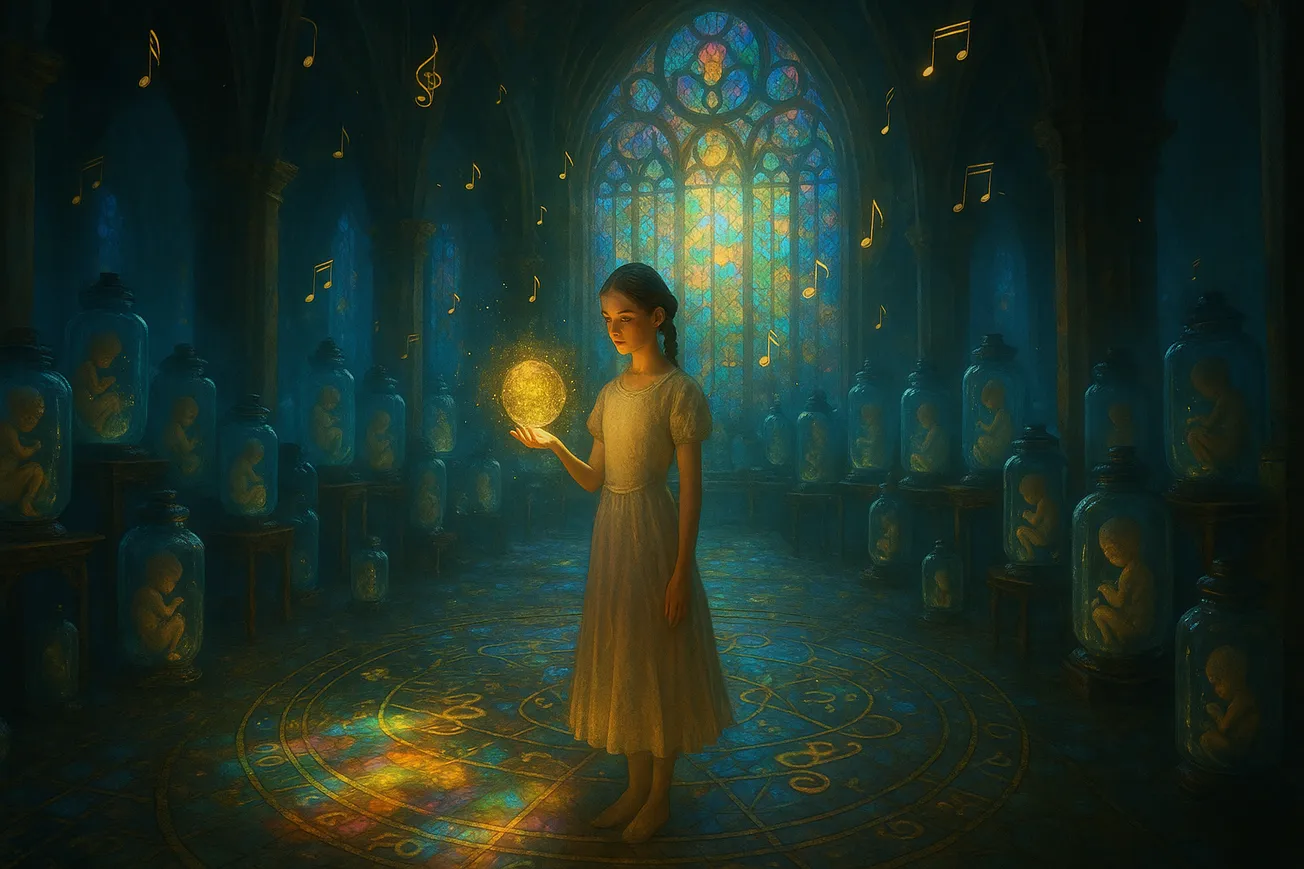🌈 The Fractal Story Engine | Society & Future | (28) SF-005-F1
Era Calyx was not born, but commissioned.
Her parents were not lovers but patrons, kneeling before the Genome Atelier with tear-stained contracts and performance charts. The Atelier, housed within the bones of a ruined cathedral, accepted only offerings of song. Her mother gave a fugue in C minor. Her father gave up his voice entirely.
The weavers sang her into pattern: tessellations of compassion with lacquered accents of competitive zeal. They laced her with equanimity and a touch of theatrical sorrow. Intelligence was threaded through the joints, so her learning would feel organic, not forced. Humor was granted, but only dry, and never self-deprecating.
When she emerged, she bore no umbilicus. Only a tattoo on her back: a sigil shaped like a scale within a clock. Beneath it, the Atelier’s motto: “Composed to Completion.”
Era grew with effortless balance. She neither bullied nor wept. Her teachers reported optimal engagement, her friends described her as “light without weight.” She excelled without visible striving. She dreamed only in clean geometries. She never stumbled.
At seventeen, she entered the Conservatory of Personality Harmonics, a vaulted institution that studied the psychology of engineered souls. Students there had been composed across multiple iterations, often with baroque flourishes or experimental flaws, but Era was the Ninth Composition, stable, streamlined, and unerringly well-regarded.
And yet, during her third year, she encountered an anomaly.
A new student arrived from the outside, a boy named Thao who had not been composed, only born. He entered the Conservatory under a loophole: his parents had forged approval records by mimicking Atelier glyphs. When discovered, the scandal was immense, but he remained, a living fault line in the age of designed behavior.
Thao was volatile. He once cried over a sculpture shaped like a collapsed lung. He kissed a lecturer during a question. He failed his self-regulation suite and laughed about it. He called Era “Glassclock” and said it with awe, not cruelty.
Era felt a thin cracking begin in her routines.
One night, he handed her a sphere filled with floating pollen and said, “This is how my emotions behave. No lattice. No conductor. Just breath and bloom.” Then he asked, “What’s it like to know who you are before you even arrive?”
She answered nothing. She had no programming for pollen.
The next morning, she visited the off-limits basement of the Conservatory, where discarded prototypes of self were archived in humming jars. The archivist, blind and cheerful, handed her a vessel labeled Calyx.0.1. Inside writhed a version of her, unstable, unrefined, dancing to a music no longer taught. It wept, then sang, then bit its own hand.
She asked the archivist, “Was this failure?”
“No,” he said. “This was first draft.”
That night she could not sleep, though she had never struggled with sleep before.
So began her deviation.
She stopped completing sentences. She wore colors not in her chart. She let herself feel boredom. She stopped offering optimal feedback. During a seminar, she asked, “Can a predetermined self ever experience surprise, or only novelty dressed as freedom?”
The faculty flagged her for recalibration. Her parents received a letter marked Amber Distortion. They arrived wearing neutral smiles and asked, “Do you require updates?”
She responded with a small, unpredicted poem:
My joy is a moth in a jar
Painted wings but born of ash
It flutters not to fly but to prove
That it once had the idea of flight
Thao disappeared one day. Rumors said he was returned to the uncurated world. Others claimed he dissolved into pollen entirely. Era never found out.
But the next term, she changed her name to Errata.
She left the Conservatory.
No record exists of where she went, only a trail of incomplete compositions, strange little melodies left etched on the walls of abandoned playgrounds and wind-chimes that rearranged themselves after sunset.
It is said that somewhere in the driftlands, a woman with steady hands and eyes like broken metronomes now composes children in silence, not song. She does not ask what the parents want.
She asks only, “What was never allowed to bloom?”
And then she listens.

